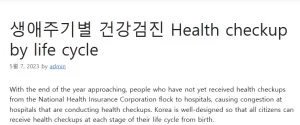With the end of the year approaching, people who have not yet received health checkups from the National Health Insurance Corporation flock to hospitals, causing congestion at hospitals that are conducting health checkups. Korea is well-designed so that all citizens can receive health checkups at each stage of their life cycle from birth.

Types of health checkup by life cycle 생애주기별 건강검진
There are 7 stages of screening for infants, starting from 4 months of age, and 4 stages of screening for students from the 1st year of elementary school to the 1st year of high school. The infant check-up closely checks the child’s developmental status and checks whether the child is growing well without becoming obese or precocious, and provides appropriate health education for the child’s growth to the guardian. Student examinations are conducted as a group by selecting two or more medical institutions in the school so that risk factors that may interfere with student health can be detected early and measures taken. 좋은뉴스
When you become an adult over the age of 19, you will receive a general health checkup once every two years or once a year, depending on where you are enrolled in health insurance (for non-office workers among health insurance company subscribers, once a year). General health checkups are aimed at early detection and treatment of chronic diseases that affect the body in the long term. Basic physical examinations such as obesity, hearing, and eyesight are performed, and tuberculosis disease is diagnosed through a simple chest radiograph. Blood tests and urine tests are performed to check for high blood pressure, diabetes, dyslipidemia, abnormal kidney function, and liver disease. General health checkups are tests for chronic diseases and are different from cancer checkups. For example, a simple chest radiograph is performed for the purpose of diagnosing tuberculosis, pneumonia, cardiac hypertrophy, etc., and not for diagnosing lung cancer. Therefore, separate tests such as low-dose lung CT are needed to detect lung tumors at an early stage. In addition, caution is needed as some people misunderstand that blood tests are all tests that can be done with blood.
It is important to have regular cancer screenings
Cancer screening is conducted for five types of cancer based on the most common types of cancer in Korea. Stomach cancer once every 2 years for those over 40 years of age, colorectal cancer once a year for those over 50 years of age, liver cancer twice a year in the high-risk group for liver cancer among those over 40 years of age, breast cancer for women over 40 years of age Once every 2 years, cervical cancer is performed once every 2 years for women aged 20 years or older.
Gastric cancer is performed by gastroscopy and gastrointestinal angiography. For an accurate examination, it is recommended to undergo a gastroscopy, even if it is difficult. Endoscopy is the best way to diagnose gastric cancer at an early stage as it allows direct viewing of the gastric wall and biopsy of suspicious parts. With the help of sleep-inducing drugs, the test can be painless.
Colorectal cancer screening is performed by fecal occult blood test. The stool is checked for blood, and if blood is positive, a colonoscopy is performed. However, if there is a tumor in the large intestine but there is no bleeding from the tumor or if there is bleeding, it will not be detected if the sample does not contain blood. Sometimes, the fecal occult blood test is recognized as a precise test to detect colon cancer and is misunderstood as an alternative to colonoscopy.
Liver cancer screening is performed for high-risk groups such as hepatitis B and C carriers, and liver ultrasound and blood tests for liver cancer markers, which can rise when liver cancer is present, are performed twice a year. Hepatitis carriers must undergo liver cancer screening conducted by the NHIS, but they should not think that they are managing hepatitis itself. It is necessary to check the activity of hepatitis regularly through the treatment of an internal medicine specialist and receive appropriate drug treatment when necessary.
Additional cancer screenings for women
Breast cancer screening is performed with mammograms. Mammography is the most basic and important test in breast cancer screening, and it is important to receive it regularly. In the case of young women, the result may be ‘normal but dense breasts’. Dense breast is not a disease, but means that the density of mammary tissue in the breast is dense, so that lesions may not be visible on mammography. However, screening for breast cancer using ultrasound alone without mammography is not appropriate (some early breast cancers are invisible on ultrasound and can only be detected on mammogram). Cervical cancer is for women over the age of 20. In particular, if you are in your 20s and are undergoing a test for the first time or have no sexual experience, you should consult with your doctor in advance.
Korea operates a systematic health checkup program for all citizens. However, since it targets a large number of people, it consists of only the necessary tests for everyone. Therefore, it is important to consult with your doctor for additional tests that are necessary according to your personal health condition and take care of them yourself. One-third of Koreans die of cancer. In order to overcome cancer, we must actively cope with and prepare for the upcoming danger with a willingness to welcome it, rather than hide behind in fear. A health checkup is the most basic first step to maintaining health.